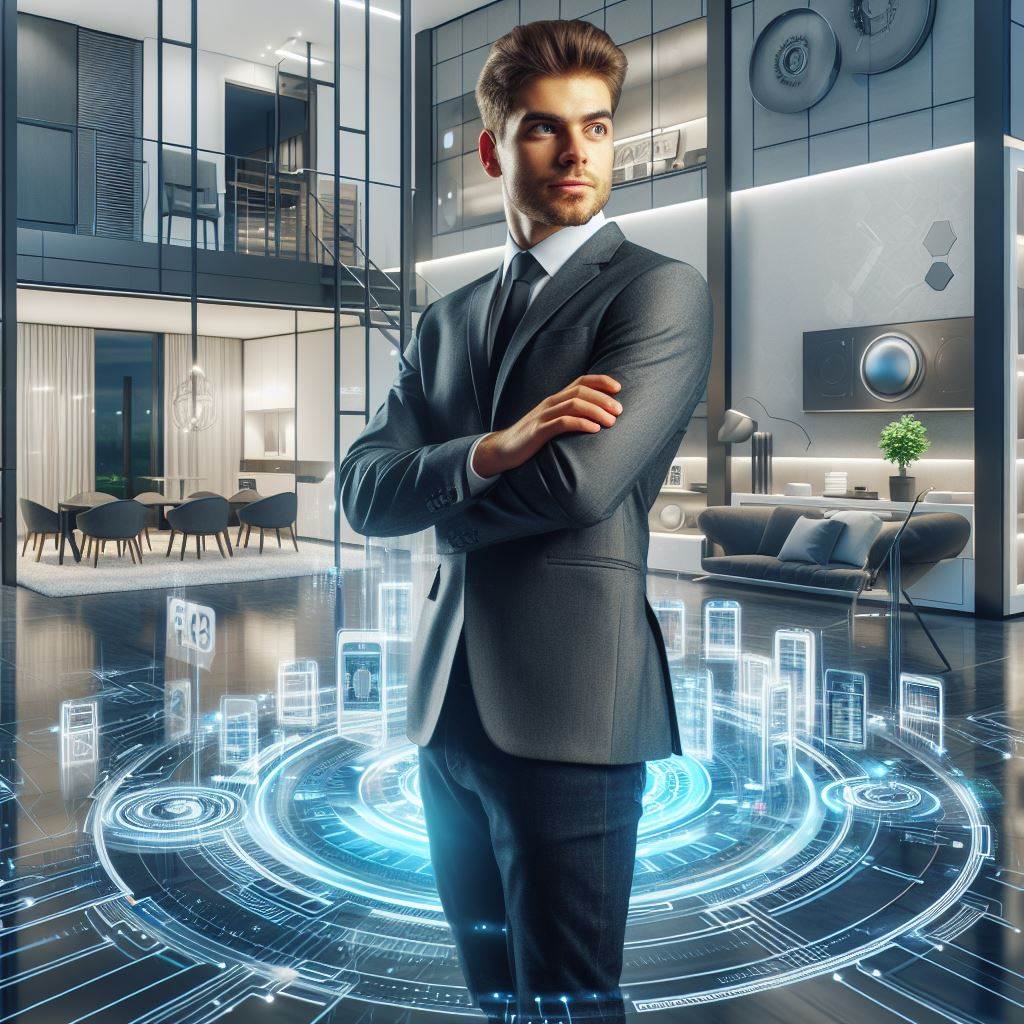Introduction
Sustainable property management is more important than ever.
As the world faces increasing environmental challenges, it is crucial to find ways to reduce our carbon footprint and use resources more efficiently.
One area where significant progress can be made is in property management.
The role of technology in achieving sustainability goals cannot be underestimated.
With the advancement of smart technology, property managers now have access to various tools and systems that can help them monitor and optimize energy usage, water consumption, and waste management.
For example, smart thermostats allow property managers to control and monitor heating and cooling systems remotely.
This ability can significantly reduce energy consumption by ensuring that heating and cooling systems are only used when necessary.
Furthermore, smart meters provide real-time data on water and energy usage, allowing property managers to identify inefficiencies and implement changes accordingly.
By detecting leaks or identifying areas where energy is being wasted, property managers can make informed decisions to improve efficiency and reduce costs.
Additionally, the use of smart sensors can help optimize waste management.
These sensors can monitor waste levels in bins and send alerts to property managers when they need to be emptied, ensuring that waste collection services are only deployed when necessary.
In essence, the importance of sustainable property management cannot be overstated.
By leveraging technology and embracing smart solutions, property managers can make significant strides towards achieving sustainability goals and creating more environmentally-friendly properties.
Benefits of Smart Tech in Property Management
Smart technology offers numerous benefits in property management, showcasing the advantages of integrating advanced technologies for sustainability and efficiency.
Improved energy efficiency
A significant benefit of implementing smart tech in property management is improved energy efficiency.
By utilizing smart thermostats, property managers can optimize energy usage and reduce energy consumption, leading to cost savings and a smaller environmental footprint.
These intelligent devices are programmed to adjust temperature settings based on occupancy and external factors, ensuring optimal comfort while minimizing energy waste.
In addition, smart meters play a crucial role in accurately tracking and managing energy consumption.
These devices provide real-time data on energy usage, allowing property managers to identify areas of high consumption and implement strategies for energy conservation.
By understanding energy patterns and making informed decisions, property owners can reduce their overall energy consumption and contribute to a greener environment.
Enhanced waste management
Another area where smart tech can revolutionize property management is waste management.
Through the implementation of IoT devices, property managers can monitor waste levels in real-time.
These sensors enable efficient waste collection, ensuring bins are emptied at optimal capacities and reducing unnecessary pick-ups.
By optimizing waste collection processes, property managers can save time, resources, and reduce carbon emissions associated with frequent waste collections.
Additionally, smart recycling systems play a crucial role in proper waste disposal.
These systems incorporate advanced sorting mechanisms that accurately separate recyclable materials, promoting environmentally friendly waste management practices.
By maximizing recycling efforts, property managers can divert waste from landfills and contribute to a circular economy.
Water conservation
Water conservation is another significant benefit offered by smart technology in property management.
Smart irrigation systems utilize weather data and soil moisture sensors to optimize water usage for irrigation purposes.
These systems automatically adjust watering schedules based on weather conditions, ensuring intelligent and efficient water usage.
By avoiding unnecessary watering, property owners can conserve water resources and reduce water bills.
Furthermore, leak detection sensors can prevent water wastage by identifying leaks in plumbing systems.
These sensors detect abnormal water flow patterns and send alerts to property managers, enabling immediate action to avoid further water loss.
By addressing leaks promptly, property owners can minimize water wastage and prevent potential damage to the property.
In fact, integrating smart technology in property management offers numerous benefits in terms of energy efficiency, waste management, and water conservation.
By implementing smart thermostats and meters, property owners can optimize energy consumption and reduce costs.
Additionally, IoT devices and smart recycling systems enable efficient waste management practices.
Smart irrigation systems and leak detection sensors contribute to intelligent water usage and prevent water wastage.
Overall, embracing smart tech in property management is a sustainable and efficient solution for property owners and the environment.
Read: Warehouse Turned Arts Hub: A Tale
Smart Tech Solutions for Indoor Comfort
In today’s fast-paced world, technology has revolutionized various aspects of our lives, including the way we manage our properties.
Smart technology, in particular, has become an integral part of sustainable property management, offering innovative solutions to enhance indoor comfort while reducing energy consumption.
In this section, we will explore the smart tech solutions available for indoor comfort.
Smart lighting systems
Smart lighting systems use automated controls based on occupancy to optimize energy usage.
These systems can detect when a room is empty and automatically turn off the lights, minimizing energy waste.
Additionally, they can integrate with smart home assistants, such as Amazon Alexa or Google Home, allowing users to control the lights through voice commands and customize their preferences.
Intelligent HVAC systems
Intelligent HVAC systems utilize advanced technology to improve temperature control and energy efficiency.
Programmable thermostats enable users to set specific temperature schedules, ensuring optimal comfort while reducing energy consumption.
Moreover, these systems support remote monitoring and adjustment, allowing property managers to control HVAC settings remotely, optimizing energy usage based on occupancy and weather conditions.
Air quality monitoring
Maintaining good indoor air quality is crucial for the well-being and comfort of occupants.
Smart sensors can measure various air quality parameters, such as temperature, humidity, carbon dioxide levels, and volatile organic compounds.
These sensors continuously monitor the air quality and provide real-time data, allowing property managers to take necessary actions to maintain a healthy environment.
Additionally, they can send alerts and notifications when air filters need replacement, ensuring clean air circulation.
Implementing smart tech solutions for indoor comfort offers numerous benefits.
Firstly, these systems promote energy efficiency by optimizing lighting and HVAC usage, resulting in reduced energy costs.
Secondly, they enhance occupant comfort by allowing personalized control over lighting and temperature preferences.
This can significantly improve productivity and overall satisfaction.
Moreover, by monitoring and maintaining indoor air quality, these systems contribute to a healthy living environment, reducing health risks associated with poor air quality.
Property managers can also benefit from the data generated by these smart tech systems.
The insights gathered from occupancy patterns, energy consumption, and air quality data can help property managers make informed decisions to further optimize resource allocation, enhance operational efficiency, and reduce maintenance costs.
In short, incorporating smart tech solutions for indoor comfort in sustainable property management is a forward-thinking approach.
From automated lighting controls to intelligent HVAC systems and air quality monitoring, these technologies offer energy-efficient, personalized, and healthy living spaces for occupants.
By investing in smart tech, property managers can improve occupant satisfaction, reduce operational costs, and contribute to a greener future.
Read: LA’s Commercial Real Estate Growth in 2024

Optimization of Maintenance and Security
Optimizing maintenance and security is crucial for sustainable property management.
With advancements in smart technology, property owners and managers can now leverage various tools and systems to ensure efficient operation and safeguard their assets.
Predictive maintenance
One of the key aspects of optimizing maintenance is the ability to predict maintenance needs before issues arise.
This proactive approach not only saves costs but also prevents equipment breakdowns that may disrupt operations.
By utilizing IoT sensors and data analysis, property managers can continuously monitor the condition of their equipment and predict maintenance requirements accurately.
The data collected from these sensors can provide valuable insights into the health and performance of critical systems, allowing maintenance personnel to intervene before major failures occur.
Additionally, predictive maintenance helps in planning and allocating resources effectively.
By identifying potential issues in advance, property owners can schedule necessary repairs and replacements, minimizing downtime and maximizing the lifespan of the equipment.
This approach reduces unnecessary maintenance costs and ensures optimal performance.
Smart security systems
Efficient security monitoring is paramount in property management.
Traditional surveillance systems often require continuous manual monitoring, making it challenging to prevent security breaches effectively.
However, with the introduction of smart security systems, property managers can now utilize video surveillance with advanced analytics.
These systems can automatically detect and alert security personnel about potential threats, ensuring swift responses and minimizing risks.
Moreover, smart security systems offer remote access and control features, enabling property owners and managers to monitor and manage security features from anywhere.
Accessible through mobile applications or web interfaces, these systems provide real-time visibility and control over security cameras, alarms, and access points.
This remote management capability enhances safety and allows for immediate response to any security incidents.
Access control and smart locks
Access control systems play a crucial role in managing the movement of individuals within a property.
By integrating digital access control systems, property managers can streamline the process of granting or revoking access permissions.
These systems eliminate the need for physical keys and simplify the management of access rights, particularly in larger properties or multi-tenant buildings.
Furthermore, smart locks offer additional convenience and security.
These locks can be remotely unlocked or monitored using mobile devices or centralized management platforms, eliminating the requirement for physical keys.
This feature enables property owners and managers to grant access to authorized individuals even when they are not physically present on-site.
Smart locks also provide an audit trail of door activities, allowing for better accountability and monitoring.
In general, optimizing maintenance and security through smart technology is essential for sustainable property management.
Predictive maintenance using IoT sensors and data analysis helps in identifying maintenance needs in advance, reducing costs and preventing equipment breakdowns.
Smart security systems offer advanced analytics, remote access, and control features for efficient security monitoring.
Access control integration and smart locks streamline management processes and enhance convenience and security.
Embracing these smart tech solutions can significantly improve property management practices and contribute to sustainability goals.
Read: Eco-Friendly Office Spaces: A Case Study
Challenges and Considerations for Implementing Smart Tech
Implementing smart tech in property management comes with its fair share of challenges and considerations.
These factors need to be carefully addressed to ensure a successful transition to a sustainable and efficient system.
Initial investment costs
One of the primary challenges faced when implementing smart tech is the initial investment costs.
Property owners and managers need to evaluate the cost-benefit analysis associated with adopting these technologies.
While the upfront expenses may seem significant, it is crucial to consider the long-term return on investment.
Smart tech can lead to cost savings and increased efficiency in property management operations.
Compatibility and integration of various smart tech devices
Another challenge is the compatibility and integration of various smart tech devices.
Property managers need to plan and select technologies that are compatible with each other.
Without proper planning, the integration process may become complicated and lead to system inefficiencies.
Interoperability is key to ensure the seamless operation of different smart tech devices, allowing them to communicate and work together efficiently.
Data privacy and cybersecurity concerns
Data privacy and cybersecurity are major concerns when implementing smart tech.
With the collection and analysis of large amounts of data, there is a risk of unauthorized access and potential breaches.
Property managers need to implement robust security measures to protect sensitive data.
This includes encrypting data, restricting access to authorized personnel, and continuously monitoring for any suspicious activities.
Additionally, compliance with privacy regulations is essential to maintain the trust of customers and stakeholders.
In review, while implementing smart tech in property management brings numerous benefits, it is crucial to address the challenges and considerations associated with it.
Evaluating the cost-benefit analysis, ensuring compatibility and integration of devices, and prioritizing data privacy and cybersecurity are key for a successful implementation.
By overcoming these challenges, property managers can harness the power of smart tech to optimize operations, improve sustainability, and create a better living environment for residents.
Read: Commercial Construction Safety: 2024 US Standards
Conclusion
Smart tech has emerged as a game-changer in sustainable property management.
Its benefits go beyond energy efficiency and cost savings, extending to improved tenant satisfaction and reduced environmental impact.
By leveraging smart tech solutions, property managers can enhance their operations and create a greener future.
Smart tech offers numerous possibilities, from connected devices that gather data to advanced analytics that provide valuable insights for decision-making.
By embracing these possibilities, property managers can optimize energy consumption, streamline maintenance processes, and improve the overall efficiency of their properties.
Therefore, it is crucial for property managers to actively explore and adopt smart tech solutions.
By doing so, they not only stay ahead of the curve but also contribute to a more sustainable future.
It is a win-win situation, where property managers can achieve their goals while also reducing their environmental footprint.
If you are a property manager, now is the time to take action.
Evaluate your property’s needs and consider implementing smart tech solutions that align with your objectives.
Engage with tech providers who specialize in sustainable property management and collaborate to find the most suitable solutions.
Together, let us embrace the power of smart tech for sustainable property management and play our part in creating a better future.




